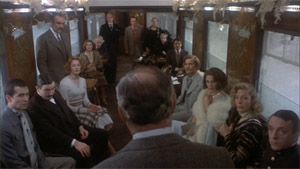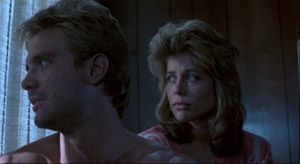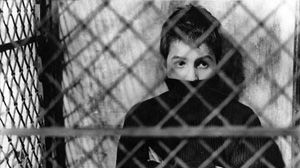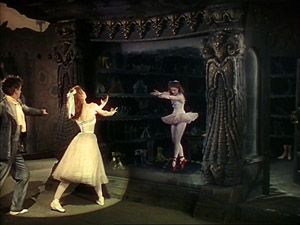
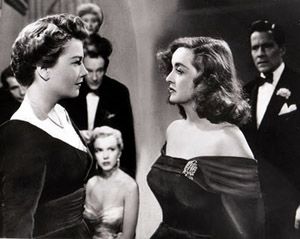
I had several problems with this film, but let me start with a few of the more minor. First of all, the characters seem more like...well, more like
characters than actual human beings. There is very little depth or complexity to anyone—provided one doesn't confuse flakiness with complexity, but more on that in a minute. (The one exception is Thelma Ritter, who of course has more natural charisma and substance in her lower lip than most actors have in their entire body.) It's not just that people seem stiff, although for the most part they do. It's more than there seems to be nothing unseen, nothing that isn't there to fill out a generic character type or propel the plot.
Speaking of which, back to the question of flakiness vs. complexity. I'm all for inconsistency in a character's actions, so long as it seems to come from some depth or internal contradiction. That's the essence of drama, but it's not what's happening here. When the plot needs Margo to turn on Eve, she simply does so—there is very little evidence of any internal struggle. Karen Richards follows the exact same hairpin arc when it's her turn to further the storyline, and with only slightly more sense that something's at stake. The men, of course, are just so many set pieces, serving the same purpose that women tend to serve in a more traditionally misogynistic film—they exist to prove something about the characters of the opposite sex, or about gender relations at large, rather than to be identifiable personalities in their own right.
Not that the film is any less misogynistic for it, of course. Two of the three female leads are flakes, and the other—Eve herself—is a cardboard cutout. We're never given much of a clue as to her motivation, probably because even the filmmakers didn't think it would be very interesting. She's an ambitious ingenue, who will step on anyone in order to get up a rung. That's all the treatment she gets, but surely even she could have been much more intriguing. Her most captivating moment is indeed when she flashes her vicious side in the one-on-one with Karen, but why couldn't we at least have more of that? She plods through most of them film so robotically that it seems she has no drive at all.
Which brings me to yet another issue. The film is, of course, 'about' gender issues. In show business specifically, but in society in general. But at least as interesting a subject, especially given the question of Eve's motivation, would have been the issue of class. Which is thoroughly—systematically, even—avoided. Even as Addison DeWitt compares himself to Eve while simultaneously claiming to 'own' her, we're never given to ask why—why would one such person end up with all the power, while the other ends up trapped even in her own success? It's a bit to do with gender, yes, but as he himself lays out the case, it's obvious: the real issue is that her name is Gertrude Slojinski, while his is Addison DeWitt. She has had to fight and scrape her way up, while he has simply waited for her at the top. Eve's greatest sin isn't being a woman. It's being a climber.
And finally, if I can return to more minor complaints, the film is just so
dry. Some films do well with a lot of dialogue, but this isn't one. Primarily because it isn't dialogue, so much as exposition and real-time analysis by the characters themselves. It could have been 45 minutes shorter, and an awful lot tighter, if they had just shut the hell up once in a while and let things
happen.
In spite of these complaints, it's not a terrible film. There are moments of good acting, especially from George Sanders and the aforementioned Thelma Ritter. And there is a worthwhile, interesting story hidden in there somewhere, even if it's obscured by a lot of talking about it and looking in the wrong direction most of the time. This is one film that I'd love to see redone, especially with an eye to more tension and suspense.

 If you've never seen The Gods Must Be Crazy, this movie will probably be pretty surprising. If you have seen it, this should still be awfully entertaining. Animals Are Beautiful People is offered more as a straightforward documentary than is its obviously-fictional descendant, and that pretense makes a beautiful stage on which to present this parody. Filmmaker Jamie Uyr treads the line carefully, and manages a nearly pitch-perfect comedic documentary (a rare genre indeed, and certainly not to be confused with the more familiar mockumentary).
If you've never seen The Gods Must Be Crazy, this movie will probably be pretty surprising. If you have seen it, this should still be awfully entertaining. Animals Are Beautiful People is offered more as a straightforward documentary than is its obviously-fictional descendant, and that pretense makes a beautiful stage on which to present this parody. Filmmaker Jamie Uyr treads the line carefully, and manages a nearly pitch-perfect comedic documentary (a rare genre indeed, and certainly not to be confused with the more familiar mockumentary).


